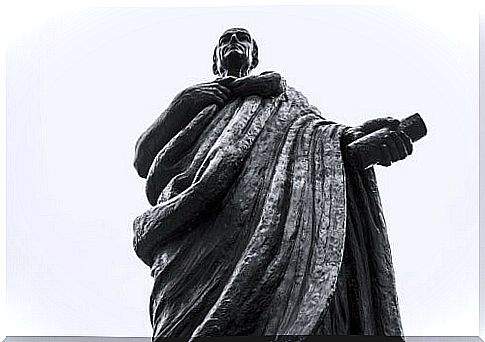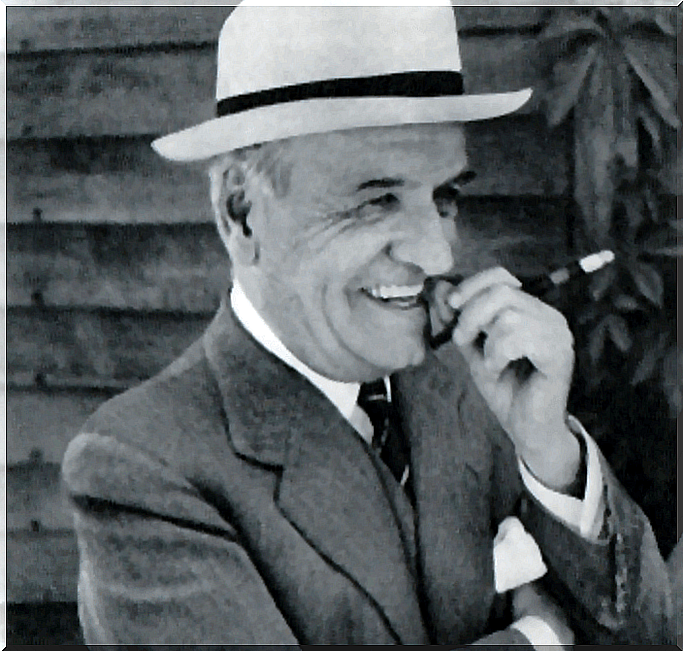The 5 Most Influential Philosophers In Psychology

Psychology, as a scientific discipline, is considered to have been born in 1879 by Wilhelm Maximilian Wundt, in Leipzig, Germany. The German physiologist and philosopher did so by creating the first experimental psychology laboratory. Since then, this discipline answers questions about human behavior through the scientific method.
Before that, human behavior and all the questions that are circumscribed to it were treated by innumerable philosophers through reflection and thought.
It is difficult to date the birth of Philosophy, but we know that at least its contributions to human knowledge are more than 2,500 years old. If we look at the ‘age’ and the path of Psychology in comparison with Philosophy, the former is minimal. It is evident that without a discipline like Philosophy, Psychology would be another. The second emanates from the first.
The ancient Greek philosophers were interested in trying to answer the question “Why do we behave as we behave?” . Now, how to answer it? Through reflection and argumentation, mainly. In fact, many of the reflections and arguments became philosophical currents, such as Rationalism or Empiricism.
During these more than 2,500 years, the contributions of philosophers to Psychology as we know it are many and very diverse. Here are collected five of the most influential philosophers and their great contributions to Psychology.
Lucio Anneo Seneca
He was born in Córdoba in IV BC and was one of the great thinkers in history. His philosophical contributions focused on the practicality of life. He was not a friend of theorizing about life, of rambling as an exercise to make us grow personally.
In a way, we can consider him as one of the most influential philosophers, since phenomena such as ‘coaching’ are nothing more than the adaptation of the thinking of philosophers like Seneca to the current world. Curiously, we can find certain parallels between Seneca and the figure of the current ‘coach’, given his vocation to help find ‘the best version’ of people.

Rene Descartes
Born in 1596, Descartes has been one of the most influential philosophers. Psychology is not the only discipline that has been influenced by this French philosopher. Other disciplines, such as mathematics, have drawn on some of his contributions.
The ordinate axes and the abscissa axis, used to represent mathematical functions, are proof of this. These axes are also called ‘Cartesian axes’.
The main contribution to psychology that Descartes made was the so-called Cartesian dualism. And for many, it was not a very positive contribution, because it divided our way of understanding the human being. Cartesian dualism was based on a distinction between mind and body as two different concepts, with different functioning.
This distinction is still valid in our time. Without being very conscious, we talk about mental problems or physical problems, sometimes sinning by not considering that one and the other are so closely related: it is a distinction that is more didactic than real.
Immanuel Kant
He was a Prussian philosopher, born in 1724. His most notable influence on psychology could be his theory of knowledge. For Kant, knowledge is the conjunction of two factors: sensitivity and understanding or, in other words, perception and thought.
In his theory, he argues that the participation of sensitivity means that we can only know phenomena and not the thing itself. That is, our senses only allow us to know reality in a limited, not complete way. To give an example, ultraviolet light is invisible to the human eye, so there are realities that we cannot assimilate because our sensitive apparatus does not allow it.
That said, the fact that we can only know phenomena leads us to relativism. Well, reality will depend on the “lens” with which the object is viewed.
Arthur Schopenhauer
Born in 1788, Arthur Schopenhauer, was a German philosopher, considered one of the most brilliant of the nineteenth century and most important in Western philosophy.
His thesis based on “intelligence obeys the will” represents the starting point of a psychology of the unconscious. Schopenhauer’s concept of will contains the foundations of the concepts of the unconscious and the id described by Freud.
In addition, he described mental processes analogous to some defense mechanisms, such as repression and displacement. He also anticipated the meaning of tongue lapses and dream interpretation
Jean-Paul Sartre
Parisian, born in 1905. This French philosopher and playwright attached great importance to the concept of freedom , especially in Existentialism is Humanism.
For Sartre, people are fully aware of who we are and how we behave. For many, his position is extreme, denying any kind of biological or social determinism. People are the owners of our own lives, since we are free.
This ‘extreme’ freedom makes men and women undeniably responsible for their behavior, its consequences and their happiness. Even being an extreme concept, this responsibility is the one that is granted to the patients or clients in the psychology consultation. He or the therapist is the one who asks, questions, advises, guides … but effective changes to get out of difficult situations are carried out by patients or clients.
José Ortega y Gasset
Madrileño, born in 1883, Ortega y Gasset is the father of perspectivism. This theory emphasizes the validity of individual experience as part of the truth. And, in fact, the absolute truth is the sum of all the individual perspectives on it. That is, perspectivism holds that from an individual perspective it is impossible to get to know the absolute truth.
The inheritance of perspectivism in psychology, especially in applied psychology, is very important. In the clinical setting, without going any further, psychologists should not impose their point of view on that of their patients or clients. If they did so, they would be performing malpractice, since their task is to make the necessary tools available to the user / client / patient to evoke changes.

Socrates
For many, the father of Philosophy. Born in Athens in 470 BC, he is one of the philosophers who has added the most to the construction of psychological intervention.
For psychologists, carrying out a good ‘Socratic dialogue’ is decisive for the future of the intervention, regardless of the casuistry in question.
Socrates has been one of the most influential philosophers for Psychology, especially in its most clinical aspect. In it, what is popularly known as Socratic dialogue alludes directly to Mayeutics , a Socratic method that consisted in making the student discover the truths for himself, through questions that made him think and reach his own conclusions.
Without this method, some psychological interventions would not make sense, since it allows the patient or client to evoke their own changes, without these being determined by the therapist.
Psychologists are experts in behavior, in general, but each person is an expert in their own behavior. Thanks to maieutics, we can teach patients or clients to be the best analysts of their own behavior.
Philosophy is very present in our lives. So much so that we are not exaggerating when saying that its influence is present not only in Psychology, but also in other scientific disciplines.









